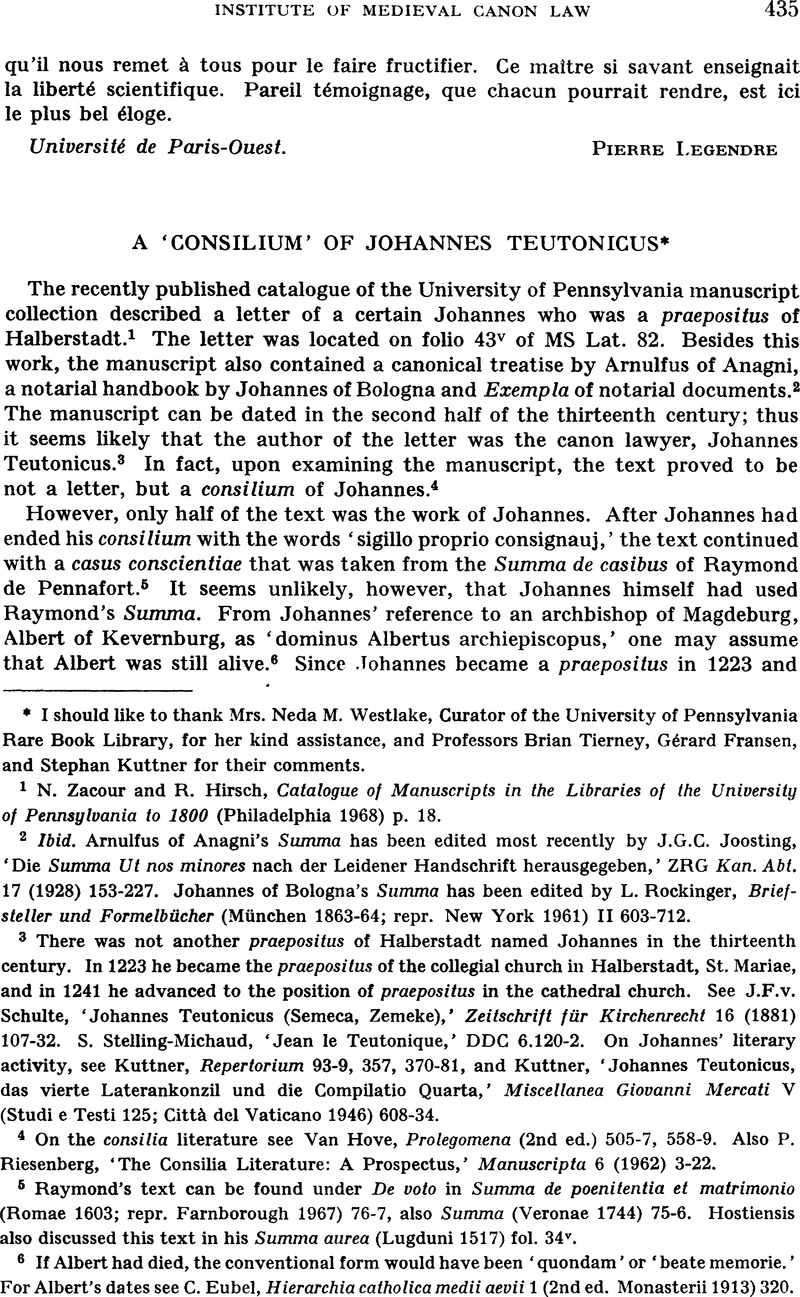Article contents
A ‘Consilium’ of Johannes Teutonicus∗
Published online by Cambridge University Press: 29 July 2016
Abstract

- Type
- Institute of Medieval Canon Law: Bulletin for 1970
- Information
- Copyright
- Copyright © Fordham University Press
References
1 Zacour, N. and Hirsch, R., Catalogue of Manuscripts in the Libraries of the University of Pennsylvania to 1800 (Philadelphia 1968) p. 18.Google Scholar
2 Ibid. Arnulfus of Anagni's Summa has been edited most recently by Joosting, J.G.C., ‘Die Summa Ut nos minores nach der Leidener Handschrift herausgegeben,’ ZRG Kan. Abt. 17 (1928) 153–227. Johannes of Bologna's Summa has been edited by Rockinger, L., Briefsteller und Formelbücher (München 1863–64; repr. New York 1961) II 603–712.Google Scholar
3 There was not another praepositus of Halberstadt named Johannes in the thirteenth century. In 1223 he became the praepositus of the collegial church in Halberstadt, St. Mariae, , and in 1241 he advanced to the position of praepositus in the cathedral church. See Schulte, J.F.v., ‘Johannes Teutonicus (Semeca, Zemeke),’ Zeitschrift für Kirchenrecht 16 (1881) 107–32. Stelling-Michaud, S., ‘Jean le Teutonique,’ DDC 6.120–2. On Johannes' literary activity, see Kuttner, , Repertorium 93–9, 357, 370–81, and Kuttner, , ‘Johannes Teutonicus, das vierte Laterankonzil und die Compilatio Quarta,’ Miscellanea Giovanni Mercati V (Studi e Testi 125; Città del Vaticano 1946) 608–34.Google Scholar
4 On the consilia literature see Van Hove, , Prolegomena (2nd ed.) 505–7, 558–9. Also Riesenberg, P., ‘The Consilia Literature: A Prospectus,’ Manuscripta 6 (1962) 3–22.CrossRefGoogle Scholar
5 Raymond's text can be found under De voto in Summa de poenitentia et matrimonio (Romae 1603; repr. Farnborough 1967) 76–7, also Summa (Veronae 1744) 75–6. Hostiensis also discussed this text in his Summa aurea (Lugduni 1517) fol. 34v .Google Scholar
6 If Albert had died, the conventional form would have been ‘quondam’ or ‘beate memorie.’ For Albert's dates see Eubel, C., Hierarchia catholica medii aevii 1 (2nd ed. Monasterii 1913) 320.Google Scholar
7 For the dates of the two recensions of Raymond's Summa, see Kuttner, S., ‘Zur Entstehungsgeschichte der Summa de casibus poenitentiae des hl. Raymund von Penyafort,’ ZRG Kan. Abt. 39 (1953) 419–34. Also Repertorium 438–52.Google Scholar
8 I found it impossible to identify this place name with certainty. Two Benedictine monasteries in Germany seem likely: either Riesa (Rezoviensis) or Kitzingen (Kitzinung, Kitczung, and various other spellings).Google Scholar
9 Cf. Benedicti regula 22.7 and 36.9 (ed. Hanslik, R., CSEL 75 [Vindobonae 1960] pp. 78,96).Google Scholar
10 3 Comp. 3.24.5 (X —). Potthast 1646, dated March 22, 1202.Google Scholar
11 A monk from Lauterberg wrote a chronicle in which he recorded Innocent's letter and the events surrounding the letter. The chronicle ended in 1225, and the chronicler did not mention a change in the privilege up to that date. See Chronicon Montis Sereni (1123–1225) ed. Eherfeuchter, E. (MGH Scriptores 23.169).Google Scholar
12 Matt. 15.14.Google Scholar
13 The catalogue lists twenty-nine; however, Clm 4595, 6020, 7208, 7821, 9664, 14789 are various summae on Raymond's Summa de casibus. Clm 9664 is the Summa ‘Quid sit symonia,’ see Traditio 16 (1960) 562, and 17 (1961) 541–2. Clm 5863 fol. 158r–233v is an apparatus to a metrical adaptation of Raymond's Summa which begins ‘Omnem scientiam et doctrinam sacra scriptura transcendit’; cf. Berlin MS theol. q. 291 (Rose, , Verzeichnis der lateinischen Handschriften No. 648).Google Scholar
14 For a discussion of the relation of Tancred's Summa to Raymond's, see Teetaert, A., ‘Summa de matrimonio sancti Raymundi de Penyafort,’ Jus Pontificium 9 (1929) 54–61, 228–34, 312–22. Also for the relation of Raymond's Summa de matrimonio to de poenitentia in the manuscript tradition, see Teetaert, , ‘La Summa de poenitentia de S. Raymond de Penyafort,’ Ephemerides theologicae Lovanienses 5 (1928) 49–72.Google Scholar
16 Most of the text is missing; it begins with 3 Comp. 4.12.2 (X 4.17.13), explicit ‘Hiis auditis, adiudicat Innocentius hanc dignitatem monasterio sancti Bertini, ut semper de cetero de ipsius gremio Altiacenses monachi sibi eligant abbatem, dum tamen ibi regularis obseruantia uigeat, et persone ydonee reperiantur que in abbates eligi mereantur,’ to 3 Comp. 5.23.10 (Professor Kuttner informs me that this corresponds to the ending of the Casus of Guido Brito; for which see his Repertorium 404f., also Miscellanea Mercati V 608 n.2).Google Scholar
16 Clm 7211 also contains Bartholomeus Brixiensis' Ordo iudicarius (finis deest) fol. 91r–92v, De arbore consanguinitatis, incipit ‘Prodest igitur arborem scire graduumque noticiam habere, cum queritur de sucessione,’ fol. 93v–94v .Google Scholar
17 On fol. 283r–285v is De arbore consanguinitatis et affinitatis; incipit, ‘Quod pictura arboris sit authentica probatur, xxxv q. v Ad sedem, circa finem’ (Johannes Teutonicus? Damasus? see Kuttner, , Misc. Mercati V 608 n.1), de affinitate, incipit ‘Affinitas est propinquitas uel attinentia personarum.’ (Vincentius Hispanus? see Kuttner, , ‘Vincentius Hispanus,’ Traditio 17 [1961] 541); the same order of the texts is found in Rouen MS 706.Google Scholar
18 Clm. 14750: also Bartholomeus Brixiensis' Quaestiones dominicales (none of the ueneriales); contains 63 abbreviated questions, fol. 125r–132v .Google Scholar
19 c.13.Google Scholar
20 c.4.Google Scholar
21 c.1.Google Scholar
22 X 4.5.1 (1 Comp. 4.5.1).Google Scholar
23 c.42.Google Scholar
24 X 3.31.9 (1 Comp. 3.27.9) and X 3.31.20 (3 Comp. 3.24.7).Google Scholar
25 c.5.Google Scholar
26 X 1.40.6 (3 Comp. 1.23.3) and X 3.32.14 (3 Comp. 3.25.1).Google Scholar
27 X 3.32.16 (3 Comp. 3.25.3).Google Scholar
- 1
- Cited by


